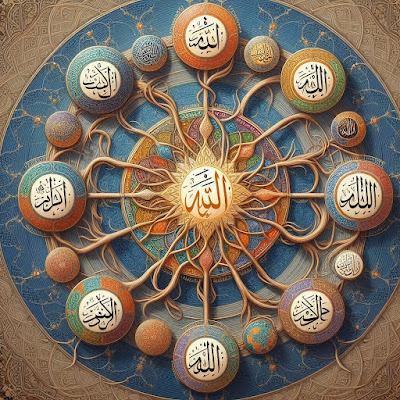Exploring Istishab: A Deep Dive into Its Philosophical Roots and Divine Names
Unpacking the Arabic Root 'S-H-B' in Relation to the Concept of Istishab, Divine Names, and Spiritual Development
Istishab is a fundamental concept in Islamic jurisprudence and philosophy, referring to the continuity of something unless evidence indicates otherwise. It is based on the idea that, once a condition or state is established (like a truth or ruling), it remains valid until proven otherwise. This principle is used in various legal and theological discussions, and it also helps us understand how divine revelation remains constant, despite changes in time or environment.
1. Istishab and Continuity of Divine Guidance in the Qur'an
The concept of Istishab can be related to the continuity of divine guidance across the Qur'an, the Tawrat (Torah), Injil (Gospel), and Zabur (Psalms). The Qur'an makes it clear that the essence of the message revealed to earlier prophets remains the same, and there is no contradiction in the divine message. For example, the principle of Tawhid (the oneness of God) and the call for justice and righteousness have always been core themes in all of Allah's revelations. This reflects the principle of Istishab, which suggests that once the message of God is established, it remains valid unless there is a new revelation that supersedes it.
Key Verses:
-
Surah Al-A'la (87:18-19):
-
"Indeed, this is in the former scriptures, the scriptures of Ibrahim and Musa."
This confirms that the divine message, including the concept of Tawhid and guidance for mankind, was already in the Tawrat and Zabur, and continues in the Qur'an. The continuity of divine truth is a form of Istishab, showing that Allah’s guidance remains constant.
-
-
Surah Al-Baqarah (2:136):
-
"Say, 'We have believed in Allah and that which has been revealed to us and that which was revealed to Ibrahim and Ismail and Ishaq and Ya'qub and the tribes, and that which was given to Musa and Isa and the prophets from their Lord. We make no distinction between any of them, and we are Muslims to Him.'"
This reinforces that the message of Tawhid and righteousness, central to the Qur'an, was the same message given to the prophets before Muhammad (PBUH). The consistency in the core principles of divine revelation is a manifestation of Istishab.
-
-
Surah Al-Imran (3:84):
-
"Say, 'We have believed in Allah and what has been revealed to us and what was revealed to Ibrahim, Ismail, Ishaq, Ya'qub, and the tribes, and what was given to Musa, Isa, and the prophets from their Lord. We make no distinction between any of them, and to Him, we have submitted.'"
This verse further shows that the divine message, despite the different prophets, has always been rooted in the same truth, affirming the consistency of Allah's will, much like the principle of Istishab.
-
-
Surah Al-Ma’idah (5:44-46):
-
"Indeed, We sent down the Torah, in which was guidance and light. The prophets who submitted to Allah judged by it for the Jews, as did the rabbis and scholars, by that which they were entrusted of the Scripture of Allah, and they were witnesses thereto."
This emphasizes that the Tawrat provided guidance, just as the Qur'an provides guidance, thus reinforcing the continuity of divine wisdom and law. This ties directly into Istishab, where the truth and guidance given to the people of the past remain valid unless a new revelation indicates otherwise.
-
2. The Qur’an as a Continuation of Divine Guidance: Istishab in Action
The Qur’an positions itself as the final revelation, which confirms and validates the truth of earlier scriptures. Istishab, in this context, reflects the Qur’an’s view that earlier scriptures, while distinct in form and context, carried the same divine essence. For instance, Tawhid and the call to righteousness are core themes throughout these revelations.
In this sense, Istishab is not about a literal continuation of the previous scripture, but rather the continuity of its core message, which remains relevant throughout time. Allah’s truth is eternal, and while the specifics of revelation may change to suit different contexts, the fundamental message of Tawhid, justice, and righteousness is unchanging.
3. Istishab and Risalatul Huqquq:
If we consider Risalatul Huqquq (The Treatise on Rights) by Imam Zaynul Abideen (AS), we see a profound alignment with the idea of Istishab. In this treatise, Imam Sajjad speaks about the rights of the individual, the community, and the state, emphasizing justice, fairness, and the oneness of God—principles that have always been part of divine law. The continuity of these rights from one scripture to the next can be seen as a reflection of Istishab—once established by divine will, the rights and the duties of humans remain until proven otherwise.
Conclusion: Istishab as the Bridge of Continuity in Divine Revelation
The concept of Istishab highlights the continuity of divine guidance from one scripture to the next. The core messages of Tawhid, justice, and righteousness have remained consistent from the Tawrat to the Injil and now the Qur'an, reinforcing that once the divine truth is revealed, it remains in place unless superseded by a new revelation. This continuity, embodied in the Qur'an, reflects the timeless nature of Allah’s guidance and His unwavering commitment to the well-being of humanity.
In this way, Istishab underscores the connection between the scriptures and the unbroken thread of divine revelation, which has been passed down through the ages, guiding humanity towards the ultimate truth of the oneness of God.




Beautifully explained
ReplyDeleteAs Salamualaikum, Thank you for visiting and for your comment, We appreciate all kinds of sincere responses. Your comments are important to us to elevate our content. Please feel free anytime. Jazak Allah.
Delete